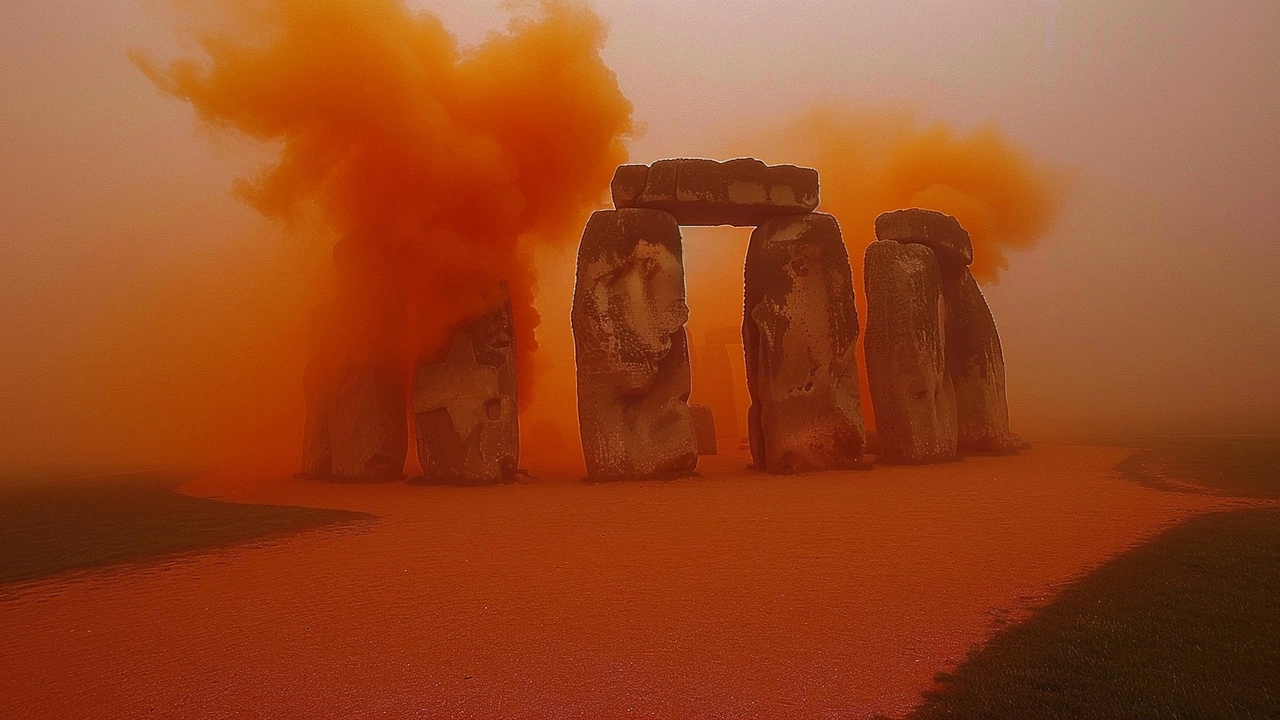June 2024: Stonehenge Paint Protest by Just Stop Oil
In June 2024, a bold stunt grabbed headlines across the UK. Two activists from the Just Stop Oil campaign sprayed orange powdered paint on the ancient stones of Stonehenge. Their goal? To push the government to sign a treaty that would phase out fossil fuels by 2030. The protest happened on June 19, the day before the Summer Solstice, turning a historic site into a flashpoint for climate debate.
What Happened at Stonehenge?
The activists chose a symbolic moment. Stonehenge, a World Heritage site, draws millions of visitors every year. By covering the stones in orange, they created an image that could not be ignored. Police arrived quickly, and the paint, being a fine powder, was removed without permanent damage. The protest was peaceful, but it sparked a wave of discussion on the limits of climate activism.
Why This Protest Matters
Just Stop Oil isn’t the first group to target cultural landmarks. Their strategy is to create visual shocks that force media coverage. In this case, the orange color matched their campaign branding and highlighted the urgency they feel about fossil fuels. By linking a prehistoric monument to modern climate policy, they forced people to think about the long‑term impact of energy choices.
Supporters argue that bold actions are needed to break through public complacency. Critics say vandalizing heritage sites is counterproductive and alienates potential allies. The debate is still ongoing, but the incident did put a 2030 fossil‑fuel‑ban deadline front and center in public conversation.
For those interested in the broader picture, this protest fits into a series of climate‑related actions across the country. From blockades at oil terminals to art installations in city squares, activists are experimenting with ways to keep the climate crisis visible. The Stonehenge stunt is a reminder that the fight for a greener future can pop up in unexpected places.
If you’re following climate news, keep an eye on how governments respond. Some officials have called for stricter policing of heritage sites, while others have hinted at reviewing energy policies. The pressure is building, and each protest adds a new layer to the conversation.
In the end, whether you agree with the tactics or not, the Stonehenge paint protest succeeded in getting people talking. It shows how a single, well‑timed action can amplify a message far beyond the immediate scene. As the summer unfolds, expect more creative, and sometimes controversial, moves from climate groups aiming to push the 2030 fossil‑fuel‑ban goal.
Stay tuned to Albany Motorsports Gateshead for updates on local events, news, and discussions that matter to our community. We’ll keep you posted on how these larger climate stories intersect with the world of motorsports and the everyday lives of fans in Gateshead.
 21 June 2024
21 June 2024
Just Stop Oil Activists Target Stonehenge with Orange Paint to Push for Fossil Fuel Ban
Two Just Stop Oil supporters vandalized Stonehenge with orange powdered paint to protest against fossil fuels. The incident took place on June 19, a day before the Summer Solstice. The activists demand the government sign a treaty to phase out fossil fuels by 2030. The event has sparked a debate on the methods used in climate activism.
Latest Posts
-

Matheus Cunha to Manchester United: €74.2m move sparks price debate
-

No Reviews for 'Wicked: For Good' Yet — Release Imminent, Embargo Holds Critics at Bay
-

Early November Snow Hits Europe: Experts Warn of Unusual Winter Risks
-

Luxury Motorbike?
-

Spencer Matthews Starts Seven Triathlons on Seven Continents in 21 Days
0